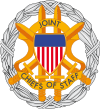Kirkland H. Donald
Kirkland H. Donald | |
|---|---|
 Admiral Kirkland H. Donald | |
| Born | September 15, 1953 |
| Allegiance | |
| Service | |
| Years of service | 1975–2012 |
| Rank | |
| Commands | Director, Naval Nuclear Propulsion Deputy Administrator, NNSA's Naval Reactors |
| Awards | Navy Distinguished Service Medal (2) Defense Superior Service Medal Legion of Merit (5) Commander of the Order of the British Empire (United Kingdom) |
Kirkland Hogue "Kirk" Donald (born September 15, 1953)[1] is a retired Admiral in the United States Navy, who in his last assignment served as the dual-hatted position of Director of Naval Nuclear Propulsion and Deputy Administrator of the National Nuclear Security Administration. Donald previously served as Commander, Submarine Force, U.S. Atlantic Fleet, and Commander, Submarine Allied Command, Atlantic. He retired from active duty, on November 2, 2012.
Education
Originally from Norlina, North Carolina, Donald graduated from the United States Naval Academy in 1975 with a Bachelor of Science in ocean engineering. He also holds an MBA from the University of Phoenix and is a graduate of Harvard University’s John F. Kennedy School of Government Senior Executive Fellows Program.
Navy career
After completing his initial nuclear power and submarine training, he served on the USS Batfish (SSN-681), USS Mariano G. Vallejo (SSBN-658), and USS Seahorse (SSN-669).
Donald was Commanding Officer of the USS Key West (SSN-722), from October 1990 to February 1993. He served as Commander, Submarine Development Squadron Twelve from August 1995 to July 1997. From June 2002 to July 2003, he was assigned as Commander, Submarine Group Eight; Commander, Submarine Force Sixth Fleet (CTF 69); Commander, Submarines Allied Naval Forces South; and Commander, Fleet Ballistic Missile Submarine Force (CTF 164) in Naples, Italy. Most recently, he served as Commander, Naval Submarine Forces; Commander, Submarine Force, U.S. Atlantic Fleet; Commander, Allied Submarine Command, Atlantic; and Commander, Task Forces 84 and 144 in Norfolk, Virginia.
His shore assignments include the Pacific Fleet Nuclear Propulsion Examining Board and on the staff of the Director of Naval Nuclear Propulsion. He also served at the Bureau of Naval Personnel (BUPERS), on the Joint Staff, and as Deputy Chief of Staff for C4I, Resources, Requirements and Assessments for the U.S. Pacific Fleet.
Admiral Donald began his tenure as Director of the Naval Nuclear Propulsion Program, on 5 November 2004 -- a uniquely eight-year posting which was originally created and served in by Admiral Hyman G. Rickover. The appointment as Director is both a military and civilian position as it is the head of both Naval Nuclear Propulsion Program in the Department of the Navy and National Nuclear Security Administration in the Department of Energy.[2] See Naval Reactors for more information.
As reported on March 25, 2008, Donald was assigned by Secretary of Defense Robert Gates to investigate the 2007 United States Air Force nuclear weapons incident where nuclear missile fuses that were mistakenly sent to the island of Taiwan.[3] Gates, when accepting the resignations of both Secretary of the Air Force Michael W. Wynne and Chief of Staff of the Air Force General T. Michael Moseley on June 5, 2008, cited the report's findings of a "decline in the Air Force's nuclear mission focus and performance" and a "lack of a critical self-assessment culture" in the Air Force.[4] However, details of Admiral Donald's specific report remain classified.
Admiral Donald was relieved as Director, Naval Nuclear Propulsion by Admiral John M. Richardson, on 3 November, 2012.[5]
Awards and decorations
Donald's awards include:
 Submarine Warfare insignia Submarine Warfare insignia
|
 |
 Office of the Joint Chiefs of Staff Identification Badge Office of the Joint Chiefs of Staff Identification Badge
|
| Navy Distinguished Service Medal with 1 gold star | |
| Defense Superior Service Medal | |
| Legion of Merit with four gold stars | |
| Meritorious Service Medal with one gold star | |
| Navy and Marine Corps Commendation Medal with three gold stars | |
| Navy and Marine Corps Achievement Medal with one gold star | |
| Joint Meritorious Unit Award | |
| Navy Unit Commendation with two bronze stars | |
| Navy Meritorious Unit Commendation with two bronze stars | |
| Battle "E" with 2 "E"s | |
| Navy Expeditionary Medal | |
| National Defense Service Medal with two bronze stars | |
| Global War on Terrorism Medal | |
| Sea Service Deployment Ribbon with silver service star | |
| Navy Arctic Service Ribbon | |
| Honorary Commander of the Order of the British Empire (United Kingdom) | |
| Navy Expert Rifleman Medal | |
| Navy Expert Pistol Medal |
Footnotes
- ^ [1]
- ^ "National Nuclear Security Administration". National Nuclear Security Administration, Department of Energy 2009. Department of Energy www.Energy.gov. Archived from the original on June 5, 2009. Retrieved 14 August 2009.
- ^ Baldor, Lolita C (2008-03-27). "Gates Orders Inventory of US Nukes". SFGate San Francisco Chronicle. Archived from the original on February 9, 2009. Retrieved 2008-06-05.
- ^ Burns, Robert (2008-06-05). "Gates accepts Air Force resignations in shake up". Associated Press. Archived from the original on 2008-06-11. Retrieved 2008-06-05.
- ^ [2]
References
- Official Biography (This work is in the public domain.)
- VFW seeks financial assistance for Donald monument
- Henderson Daily Dispatch: Admiral Kirkland Donald honored with monument by Veterans of Foreign Wars
- Pentagon Admits Mistake in Arms Shipment
External links
![]() Media related to Kirkland H. Donald at Wikimedia Commons
Media related to Kirkland H. Donald at Wikimedia Commons
- United States Navy admirals
- Recipients of the Navy Distinguished Service Medal
- Recipients of the Legion of Merit
- United States Naval Academy alumni
- University of Phoenix alumni
- John F. Kennedy School of Government alumni
- People from Warren County, North Carolina
- Living people
- 1953 births
- Recipients of the Defense Superior Service Medal
